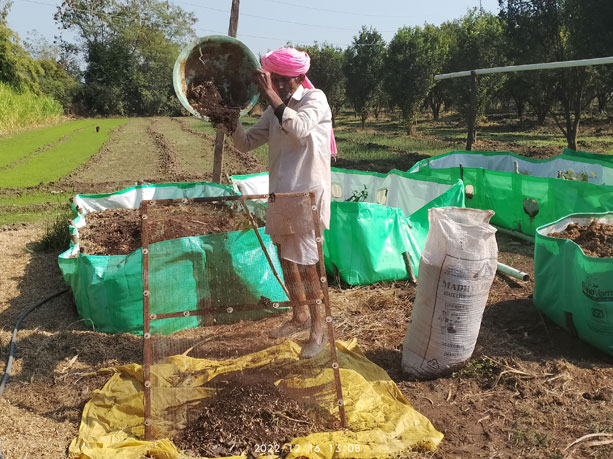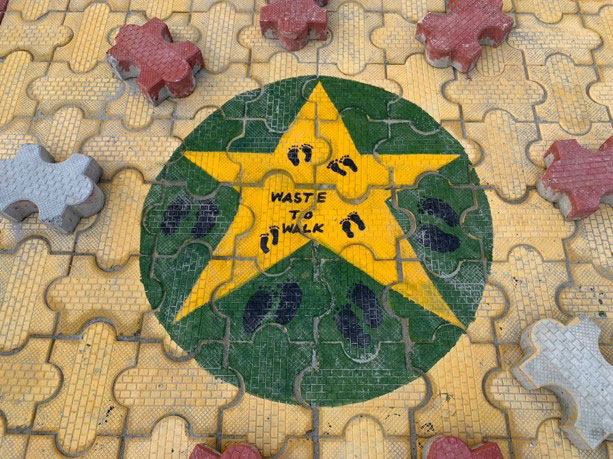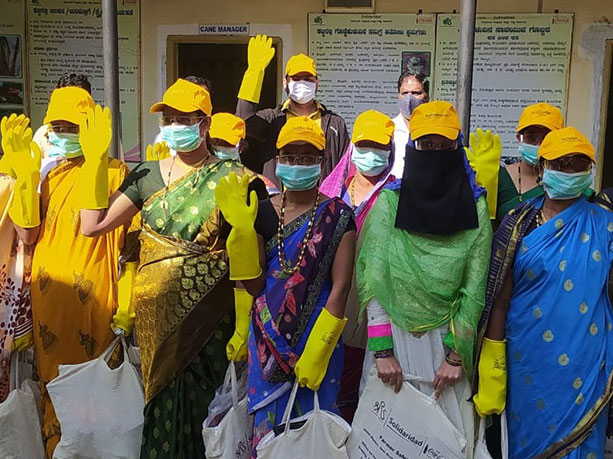Solidaridad Regional Expertise Centre (SREC) is driven by its vision and mission, through which it seeks to address the challenges posed by India’s rapidly increasing population and an equally rapid reduction of its poverty, putting pressure on its land and water resources. Today, consumers want more food, more fibre for cloth and more feed for their animals. SREC believes that this ever-growing demand can be sustained only if the agricultural sector makes a transition towards smart and sustainable land and water use, increase its production by adopting efficient processes, coupled with less pollution, greater precision in the use of fertilisers and pesticides, and a reduction in the use of water and energy.
SREC is working together with small farmers, workers, local authorities, private sector and research institutes as a catalyst for improved food production, a safer workplace, access to clean water, and a better income.
SREC Centre is a Charitable Trust established in December 2008, registered under the Indian Registration Act, 1908 and 80 G & 12 AA of The Income Tax Act, 1961. Wherein we,


Sixty-five-year-old Kanwar Lal of Narwal village in Agar Malwa district of Madhya Pradesh had been practicing chemical intensive farming on his 8-acre land for several years read more

How one of the largest leather clusters in India is turning to sustainability, one block at a time, with Solidaridad Regional Expertise Centre’s ‘Waste to Walk’ read more

Forty-two-year-old Indira Kadam is an anganwadi worker in Munoli village in Belagavi district of Karnataka in southern India. A single woman, she read more
Issue/Volume: 30/02



Soybean Farmers’ Conclave 2025 Felicitates Farmers, Sparks Dialogue on Farmers’ Welfare, Market Linkages, and More
Solidaridad, in collaboration with The Soybean Processors Association of India (SOPA India), organized the Soybean Farmers’ Conclave 2025, on 6 June. The event was part of the EU-India Partnership for Regenerative Agriculture, and it focused on sustainable practices in the edible oil value chain.
Held in the village of Siradi in Madhya Pradesh’s Sehore district, the event saw the participation and felicitation of farmers for their exemplary and inspirational adoption of regenerative agriculture. The conclave also hosted a dialogue session on farmers’ welfare, market linkages, and policy support.

Good Farming–Good Food Programme Bridges the Gap between Agriculture and Nutrition
Achieving food and nutrition security starts at the household level.
In rural Madhya Pradesh, beset by malnutrition, soy has emerged as an accessible, easily available solution. Under the Good Farming–Good Food programme, Solidaridad is supporting farming families to meet their dietary needs by combining good agricultural practices with improved nutrition, successfully bridging the gap between the two.
Core components of the programme include:

Training Sessions in Nagpur Highlight Useful Practices for Kharif Season
In Maharashtra’s Nagpur district, Solidaridad conducted farmers’ training sessions in June across multiple locations: at Khumari village on 16 June, at Patansawagi village on 17 June 2025, and at Chargaon and Sonkhamb villages on 24 June.
Our staff discussed good agricultural practices, seed germination tests, seed treatment, regenagri practices and the use of Smart Agri advisories in planning agricultural activities. During the training at Patansawagi village, trichoderma (a fungus used as a biological fertilizer) and pigeon pea seeds were distributed to the farmers under the National Food Security Mission. These trainings were conducted in convergence with the agriculture department and the Regional Centre for Organic and Natural Farming.
During these sessions, we also discussed the package of practices for kharif season, high-density planting system, the benefits of broad bed and furrow (BBF) sowing, importance of crop rotation, intercropping, border and trap crops.

Convergence Sessions Promote Modern, Scientific Agricultural Practices among Farmers
Training sessions in convergence with different institutions in the agriculture sector bring resource persons from these institutions together and empower farmers on agricultural activities. On 8 June, Solidaridad conducted farmers’ training at its Talegaon Resource and Training Centre in Amravati district, Maharashtra. The following day, at Kanyadhol village in Nagpur district, another such session was conducted in convergence with the agriculture department.
Solidaridad staff and officials from the Indian Council of Agriculture Research (ICAR) and the Central Institute for Cotton Research (CICR), agriculture department and the Krishi Vigyan Kendra served as the resource people for the training. Officials from the agriculture department talked about the Vikasit Krushi Sankalpa Abhiyaan, a nationwide campaign launched by the Indian government to modernize Indian agriculture through scientific outreach, sustainable practices and farmers’ empowerment. Scientists from the Indian Council of Agricultural Research (ICAR) explained pre-kharif farm management. Solidaridad staff guided farmers regarding sowing, gap filling, dry spells, agri advisories and good agricultural practices.

Non-GM Seed Distribution among Cotton Farmers Advances Goals of Sustainable Farming
This month, Solidaridad distributed non-genetically modified (non-GM) cotton seeds to farmers under the Organic Farming Programme supported by Organic Cotton Accelerator (OCA). The seeds were distributed among the internal control systems (ICS) of Bemda Dam and Amla Vishweshwar farmer producer organizations in Maharashtra’s Yavatmal and Amravati districts, respectively.
Solidaridad promotes non-GM cotton seeds keeping in mind the drawbacks of using GM seeds: overdependence, pest resistance, high input costs, and environmental concerns. Non-GM cotton seeds are beneficial for practising water-efficient agriculture.
The use of non-GM seeds helps promote sustainable cotton farming practices and enables farmers to gain improved incomes. While distributing the seeds, capacity-building sessions on the benefits of non-GM cotton seeds, seed treatment, germination and spacing were provided to the members of the ICS of both groups.

Health and Safety Workshop in Bantala Leather Cluster, Kolkata, Takes Stock of Working Environment in Tanneries
A focused occupational health and safety (OHS) workshop was conducted on 17 June in the Bantala leather cluster, Kolkata. The workshop was a follow-up initiative to a similar activity held a few months ago during the Health and Safety Week. Participants included factory managers, supervisors, and workers, all of whom reaffirmed their commitment to creating a safer and healthier work environment.
Five tanneries, associated with the project supported by the Netherlands Fund for Responsible Business (FVO), participated in the workshop. This session aimed to reinforce safety awareness in terms of workers’ health and hygiene, review progress since the last initiative and address ongoing challenges pertaining to workplace safety practices.
The workshop featured interactive discussions and practical demonstration of ergonomic practices relevant to tannery and leather processing units. Special attention was given to the use of protective equipment, chemical handling and emergency response.
The workshop also highlighted positive changes observed after the Health & Safety Week, and encouraged a culture of continuous improvement in safety parameters.

Our message on World Environment Day this year was a clear one: Say no to pollution. In keeping with this theme, we shed light on our efforts to curb pollution in the leather sector, as well as plastic pollution in agricultural farms.


Did you know that a number of eco-friendly interventions implemented by Solidaridad in the Kolkata leather cluster have resulted in avoidance of 2.3 × 10⁵ tCO₂-eq emissions in three years? This is equivalent to CO₂ absorbed by 230,000 trees growing for 40 years.
Our interventions in this sector cover diverse aspects—from technological innovations in tanneries, to circular, waste-to-value approaches, to green-energy solutions, and more. These interventions have collectively reduced solid waste discharge, effluent discharge and greenhouse emissions, besides optimizing water usage and creating green jobs in the leather sector.


On 5 June, Solidaridad and BASF-Nunhems came together under the HSPF programme to raise awareness on plastic pollution in agriculture, as well as to promote regenerative farming practices. More than 80 farmers, including women leaders from Dhar and Jhabua districts of Madhya Pradesh, participated in this interactive, grassroots-level training at grassroots level.
Farmers took a pledge to reduce plastic use and adopt nature-based solutions like cover cropping, indigenous bio-inputs, and agroforestry. Moringa saplings were also distributed among the participants to promote biodiversity.


We also observed World Environment Day in Maharashtra’s Nagpur, Wardha and Amravati districts under the theme of ‘Ending Plastic Pollution’. Plantation drives were conducted all through the day, in collaboration with the state Social Forestry division (of the Forest Department) and the agriculture department. Solidaridad staff guided farmers on maintaining environmental well-being and biodiversity conservation, careful use of natural resources, good agricultural practices, and reducing the use of chemicals and plastic. Solidaridad experts also discussed the efficient use of water for agriculture activities.

Welcoming a New Spring,
Basanta Swain, a small holder farmer from Bibhutipada village of Cuttack district, Odisha, supports his family of six from the proceeds of his one-acre-large farm and two days. But, practising agriculture the conventional way meant that his means were rather limited.
Six months ago, Basanta joined the Smart Agri Project and learned the techniques of sustainable farming. He decided to adopt regenerative agriculture practices and judiciously applied organic fertilizers and pesticides. In line with Smart Agri advisory, he also started to efficiently manage water use on his plot.
With the technical guidance and some critical inputs provided by the project, he cultivated cucumber, ridge gourd, okra and pumpkin in 8 dismil (0.07 acres) of land. He applied nutrients like jeevamrut, ghana jeevamrut, vermicompost, neem cakes, and used neem oil and sanjeevani for pest management. He may have spent ₹2,000 on fertilizers, pesticides, irrigation, and labour costs, but the improvement in yield has more than made up for this expenditure. In the first phase, Basanta has harvested 2.5 quintals of cucumber, earning him ₹7,500, and 50 kg of ridge gourd that has provided him an extra ₹2,000.
Encouraged by the results of his regenerative farming venture and the income generated in a short span of time, Basanta now wants to expand the area under sustainable agriculture. His success has also sent a positive message to the farmers in his neighbourhood, who are now also looking to take the leap of faith and embrace regenerative farming.

Ms. Gunja Kirti, joined us on 19 June as Manager-CSR and Sustainability.
She comes with more than 13 years of cross-sectoral experience in programme development, policy advocacy, social inclusion, and capacity building. She has worked extensively with the government departments, civil society organizations, and international partners to promote gender-responsive governance, community-led development, environmental rights, and livelihood opportunities. She specializes in strategic programme design, stakeholder management, institutional strengthening, team management and Monitoring, Evaluation, and Learning (MEL) frameworks.
Previously, she has worked with Transform Rural India Foundation and World-Wide Fund for Nature.
She has prior experience of working on projects with BMGF, Ministry of Panchayati Raj and EU.She has completed her MBA in Rural Development from G.B. Pant Social Science Institute, University of Allahabad and B.Com from University of Allahabad.